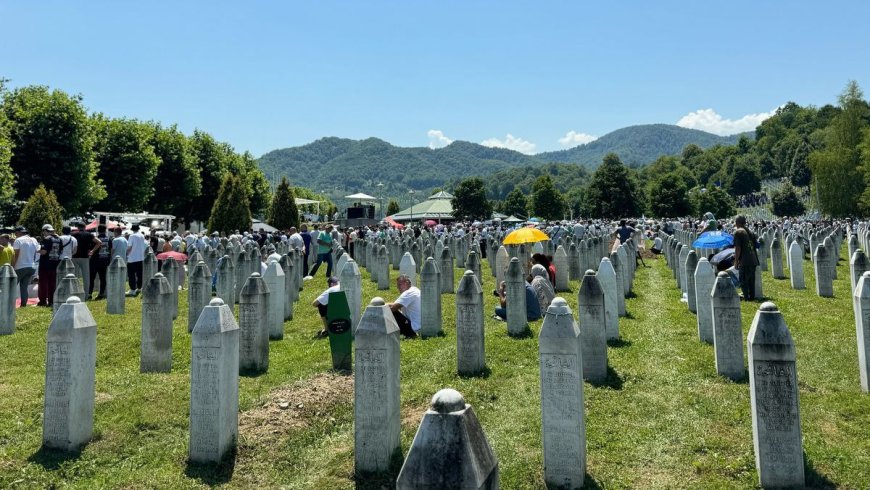Bosnia Honors Srebrenica Genocide Victims with Solemn Commemoration and International Recognition

Thousands gathered under scorching sun at the Srebrenica Memorial Centre in eastern Bosnia on Thursday to mark the 29th anniversary of the Srebrenica genocide, where 14 newly identified victims were laid to rest. This somber event, attended by both domestic and foreign dignitaries, served as a poignant reminder of the atrocities committed during the Bosnian War.
The genocide, perpetrated by Bosnian Serb forces in July 1995, claimed the lives of over 8,000 Bosniak men and boys. The International Criminal Tribunal for the Former Yugoslavia (ICTY) has unequivocally classified these massacres as genocide, making Srebrenica a chilling chapter in modern European history.
Munira Subasic, president of the Mothers of Srebrenica association, delivered a passionate address at the memorial, condemning the world's failure to prevent such atrocities and warning against genocide denial—a sentiment still prevalent in Bosnia and Herzegovina and across the Balkans.
The commemoration coincided with significant international developments. Earlier this year, the UN General Assembly designated July 11 as the International Day of Reflection and Commemoration of the Srebrenica Genocide, marking a global recognition of the event's significance. For the first time, this solemn occasion was commemorated at a high-level event at the United Nations headquarters in New York.
In neighboring Serbia, civil society groups and individuals gathered for a silent vigil in Belgrade's city center, advocating for a national Srebrenica Genocide Remembrance Day—a proposal rejected by the Serbian government, which disputes the genocide classification.
Montenegro also observed the anniversary, with President Jakov Milatovic emphasizing the need to heed the lessons of history to prevent future atrocities. In Kosovo's capital, Pristina, parliament convened a special session to honor the victims, underscoring regional solidarity with Bosnia.
Turkish President Recep Tayyip Erdogan issued a presidential decree establishing July 11 as Srebrenica Genocide Remembrance Day in Turkey, reaffirming Turkey's commitment to remembering the victims and condemning genocide globally.
Further west, in Bradford, England, and other Western European cities, communities raised flags and held events to commemorate the Srebrenica genocide, highlighting the event's resonance across borders and generations.
The annual March for Srebrenica organized by the Bosniak National Council in Skopje, North Macedonia, also drew participants, illustrating the enduring impact of the genocide on regional communities.
As Bosnia and its international partners reflect on the 29th anniversary of the Srebrenica genocide, the event serves as a poignant reminder of the ongoing quest for justice, remembrance, and reconciliation in the heart of Europe.
Tags:
- Srebrenica genocide
- Srebrenica memorial
- Bosnia war crimes
- ICTY rulings
- Bosnian Serb forces
- International Criminal Tribunal for the Former Yugoslavia
- Genocide denial
- Srebrenica massacre victims
- Bosnia Herzegovina history
- Balkan conflicts
- United Nations resolutions on Srebrenica
- Munira Subasic speeches
- July 11 remembrance events
- Memorial ceremonies Bosnia
- Ethnic cleansing Bosnia
- Human rights violations Balkans
- War crimes trials
- Bosnian genocide recognition
- European history atrocities
- Bosnia conflict aftermath













































